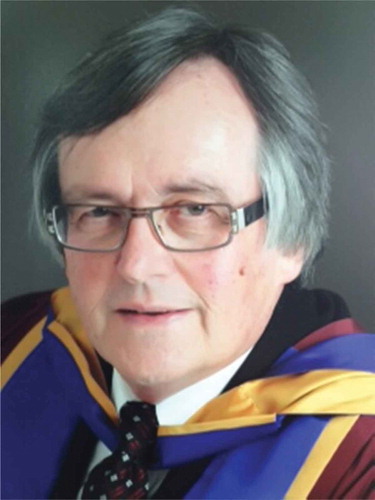On 6 January 2016, after a year-long valiant struggle with cancer, our dear friend and colleague succumbed to the disease at his home in Melbourne. Ross was much respected and loved by all who knew him—his students, colleagues, friends and, above all, his family.
Ross was born on 30 November 1937 in a small township, Coutts Crossing, a short distance from Armidale, New South Wales, where his father was the Principal of the local school. There, in those early days. he acquired the desire to follow a teaching profession—he wanted to be a teacher ‘just like Dad’.
He completed teacher training and taught in Newcastle, New South Wales, before being appointed to the teaching staff of the Armidale Teachers’ College. He subsequently won a scholarship to pursue PhD studies at the University of British Columbia, in Vancouver, Canada.
While at the Armidale Teachers College Ross met and was inspired by James Bird which led to his lifelong interest in ports and shipping and in due course would lead to a paradigm change. Ross had a particular fascination in how ports grow, in particular how they grow and compete in the Pacific northwest. The timing of this research was particularly relevant as it coincided with significant technological changes in shipping and ports—indeed the introduction of containerisation.
He began to question the reigning paradigm of ports located along the coast serving their hinterland and began to investigate whether ports, in fact, grew and competed because they were locked into shipping networks—into topological rather than topographical networks. A graph theoretic framework—Markovian theory describing movement and the structuring of space in a regional science perspective offered new insights into port growth and competition.
Furthermore, the PhD research was focused not only on local network linkages and the dominance of the port of Vancouver but also on much wider and more strategic issues that were being driven by the emerging pressures of containerisation. In particular, the port of Vancouver was locked into the question of whether or not the new trans-Pacific container services from Hong Kong and Singapore would focus on the Canadian ports and onto the port of Vancouver or whether ships would be diverted to Montreal and the US ports via the Panama Canal.
Ross’ seminal PhD research led to an invitation for him to join UNCTAD’s newly formed Port Research Team in Geneva. After 2 years in Geneva, Ross and his family moved back to Australia where he took up a position at the University of Wollongong. It was not long, however, before the United Nations enticed him back into its ranks—this time directing the Port Development and Inland Waterways Program under the auspices of ESCAP.
After 5 years in this position, he returned to Australia where he took up a further appointment at the University of Wollongong. Subsequently he held positions at the University of Sydney, the Macquarie Graduate School of Management, the University of Melbourne and the Australian Maritime College at the University of Tasmania.
Ross’ fascination with the maritime sector continued and his publications were ground breaking and always original never succumbing to the ‘publish or perish’ mentality. Rather, each work was thought provoking, highly conceptual and he always applied this thinking to major global empirical studies—the iron ore and export coal chains from Australia, for example.
Fast forward now to the turn of the century and to 2015. Maritime and port networks still exist and ports continue to grow and compete—but, arguably, there are fundamental processes forcing a new conceptual framework—that the efficiency of the global supply chain is likely to be determined by the level of modal integration. This type of efficiency is not determined by infrastructure per se—infrastructure is a necessary but not sufficient condition in itself! Ports, he argued, are elements in value-driven chains, and it is the chain that delivers value to the customer and the customer’s customer.
Ross was not an ‘ivory tower’ academic and, like his father, was a devoted teacher. He loved teaching and he was dedicated to his students who revered him—a feeling reciprocated by Ross.
Ross lived a full life always dedicated to whatever task was at hand. He grew up enjoying a privileged background in the loving and peaceful environment of a small township in New South Wales during the 1940s at a time when much of the world was at war. He always appreciated and cherished this privilege which was the major reason he sought and continued unfailingly to contribute to the well-being of others. That a ‘boy from the bush’ developed and maintained such a complete and absorbing interest in maritime efficiency is in itself wondrous and an elegant testimony to his towering intellect.
Ross died a peaceful death surrounded by love. Right up to the end he was mentally alert, still deeply involved in supervising his students and still the consummate organiser. A few days before he died he gave me instructions with regard to his funeral and details he would like included in the eulogy.
I would like to complete this statement in Ross’ own words which he dictated to me just before he died
People must know that I have had a life surrounded by love—loving parents who gave total love, loving people and family and friends, a loving brother and his family. Norma’s wonderful family, my own very dear family—my children and grandchildren, my extended family, my loving students, dearest colleagues in universities in which I have worked; in the United Nations, the World Bank, the Asia Development and the International Association of Maritime Economists. I have been so privileged to have been surrounded by people of goodwill around the world—so privileged to have known and to have had such a wonderful family and friends.
Vale dearest friend, mentor and colleague.

